You also want an ePaper? Increase the reach of your titles
YUMPU automatically turns print PDFs into web optimized ePapers that Google loves.
done with his hands. So<br />
you can see the symbols<br />
of all trades inscribed<br />
along with the names of<br />
Christians throughout the<br />
burial chambers in the<br />
catacombs.<br />
Jesus learned his approach<br />
to work from his<br />
father, St. Joseph — who<br />
learned it surely from the<br />
Book of Genesis. The<br />
biblical understanding<br />
of labor — as something<br />
positive, honorable, and<br />
holy — was uniquely<br />
Jewish. It did not come<br />
naturally to other peoples.<br />
The Greeks, in fact, disdained<br />
manual laborers<br />
and tried to minimize<br />
their participation in<br />
democracy. Socrates<br />
held that full citizenship<br />
should be granted only<br />
to the leisured classes<br />
— and, in fact, citizens<br />
should be forbidden “to<br />
exercise any mechanical<br />
craft at all.” Aristotle<br />
agreed, adding, “<strong>No</strong> man can practice<br />
virtue who is living the life of a mechanic<br />
or laborer.”<br />
The Greek historian Herodotus observed<br />
that this attitude toward laborers<br />
was universal. “I know that in Thrace<br />
and Scythia and Persia and Lydia and<br />
nearly all foreign countries, those who<br />
learn trades are held in less esteem<br />
than the rest of the people, and those<br />
who have least to do with artisans’ work<br />
… are highly honored.”<br />
Yet the Jews never looked at work that<br />
way. We read in the Talmud that “A<br />
man has a duty to teach his son a trade.<br />
… Anyone who does not teach his<br />
son a trade, teaches him to steal.” And<br />
elsewhere the rabbis said, “Seven years<br />
lasted the famine, but it came not to<br />
the craftsman’s door.”<br />
Jews — and later Christians — saw<br />
profound dignity in workers and their<br />
works. The synagogues and churches<br />
in antiquity were filled with laborers,<br />
who worshiped a Laborer and whose<br />
Scriptures preserved not the arguments<br />
of philosophers, but the stories of<br />
people who got work done. Abel was<br />
a herdsman. <strong>No</strong>ah was a sailor. Jacob<br />
leaned into a plow. St. Peter and St.<br />
John were fishermen. St. Paul made<br />
tents and canopies.<br />
These men got dirty and sweaty every<br />
day. And so the tradition-minded<br />
Greeks and Romans could dismiss<br />
them as ignoble.<br />
The idea that ordinary labor had<br />
dignity — the idea that ordinary work<br />
could be something divine — this was<br />
one of those crazy Christian ideas that<br />
scandalized the pagan world. It was<br />
like the idea of a crucified God, or of<br />
ordinary people eating God at Mass.<br />
Pagans mocked them. But Christians<br />
seemed to revel in every insult. The<br />
Church Fathers didn’t hesitate to<br />
portray Jesus working at various trades.<br />
And everyone recognized this as a<br />
radical idea.<br />
The pagan gods were projections of<br />
the upper classes, and the Greek and<br />
Roman myths were narratives of the<br />
horrible mischief of a leisurely life.<br />
But the God of the New Testament<br />
was a carpenter, whose earthly father<br />
was a carpenter, and<br />
whose Father in heaven<br />
was not drinking and<br />
womanizing, but always<br />
toiling. Jesus told his<br />
opponents, “My Father<br />
is working still, and I am<br />
working” (John 5:17).<br />
A 16th-century illustration of St.<br />
Clement of Alexandria by French<br />
Franciscan explorer and writer<br />
André Thevet.<br />
| WIKIMEDIA COMMONS<br />
The lesson was not lost<br />
on the early Christians.<br />
St. Clement of Alexandria,<br />
writing around<br />
A.D. 190, reminded new<br />
converts that there was<br />
no need for them to quit<br />
their jobs: “Tend to your<br />
farming if you’re a farmer;<br />
but know God while you<br />
labor in the fields. Sail if<br />
navigation is your profession,<br />
but invoke always<br />
the celestial pilot.”<br />
And such preaching was effective. It<br />
converted people in every walk of life.<br />
St. Clement’s contemporary, Tertullian<br />
of Carthage, boasted of the Church’s<br />
explosive growth. “We emerged only<br />
yesterday, and we have filled every<br />
place among you — cities, islands,<br />
fortresses, towns, marketplaces, military<br />
camps, tribes, companies, palace, senate,<br />
forum. We have left nothing to you<br />
but the temples of your gods.”<br />
In the world, Christians were as omnipresent<br />
as God; and, like their God,<br />
they were working still. The new Christian<br />
faith led them not to abandon<br />
their duties, but to excel in them. And<br />
this distinguished Christianity from<br />
other world religions.<br />
Their work was holy. They learned<br />
this from Jesus, who had learned<br />
it from his father — St. Joseph the<br />
Worker.<br />
Mike Aquilina is the author of many<br />
books, including “St. Joseph and His<br />
World” (Scepter, $11.48). He is a contributing<br />
editor for <strong>Angelus</strong> <strong>News</strong>.<br />
22 • ANGELUS • <strong>May</strong> 7, <strong>2021</strong>


















